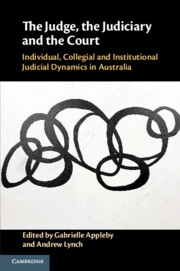 The Judge, the Judiciary and the Court
The Judge, the Judiciary and the Court Book contents
- The Judge, the Judiciary and the Court
- The Judge, the Judiciary and the Court
- Copyright page
- Contents
- Figures
- Tables
- Contributors
- Foreword
- Cases
- Part I The Judge, the Judiciary and the Court
- Part II Debates and Challenges to the Judicial Role
- 4 Dismantling the Diversity Deficit
- 5 Technology and the Judicial Role
- 6 Emotion Work as Judicial Work
- 7 The Persistent Pejorative
- Part III The Judiciary as a Collective
- Part IV Perceptions
- Index
6 - Emotion Work as Judicial Work
from Part II - Debates and Challenges to the Judicial Role
Published online by Cambridge University Press: 04 May 2021
- The Judge, the Judiciary and the Court
- The Judge, the Judiciary and the Court
- Copyright page
- Contents
- Figures
- Tables
- Contributors
- Foreword
- Cases
- Part I The Judge, the Judiciary and the Court
- Part II Debates and Challenges to the Judicial Role
- 4 Dismantling the Diversity Deficit
- 5 Technology and the Judicial Role
- 6 Emotion Work as Judicial Work
- 7 The Persistent Pejorative
- Part III The Judiciary as a Collective
- Part IV Perceptions
- Index
Summary
The emotional dimensions of judicial work are investigated from various perspectives and methods. A focus of this emerging research is the idea that emotion is not entirely spontaneous, uncontrolled or irrational. Emotions can be resources in everyday judicial work, as well as needing regulation. This chapter investigates judicial experience and display of emotion, including judicial officers’ observations, anticipation or perception of the emotion of others, and the practices judicial officers adopt to manage their own emotions and those of others. Close examination of two segments from interviews with judicial officers using a sociological framework draws out the layered dimensions of judicial emotion work. Although this work occurs within institutional and organisational constraints, in particular the dominant cultural script of judicial dispassion, this analysis demonstrates multiple ways emotion is a resource to achieve practical, normative and ethical goals and confirms the intertwining of emotion work with judicial work.
- Type
- Chapter
- Information
- The Judge, the Judiciary and the CourtIndividual, Collegial and Institutional Judicial Dynamics in Australia, pp. 143 - 162Publisher: Cambridge University PressPrint publication year: 2021
